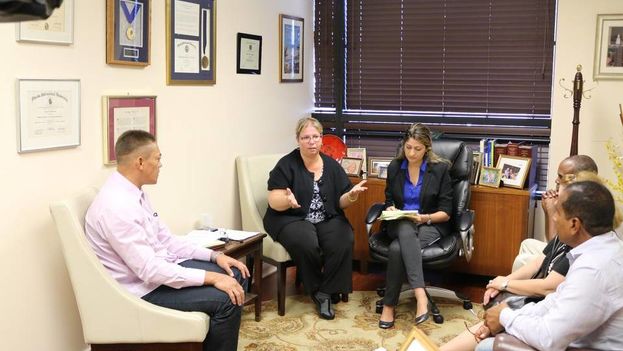
![]() 14ymedio, Abel Fernandez and Mario Penton, Miami, 28 April 2016 – Former Cuban political prisoners Niorvis Rivera, Aracelio Riviaux and Jorge Ramirezmet Thursday in Miami with staff for Representative Ileana Ros-Lehtinen for help in bringing their relatives from Cuba.
14ymedio, Abel Fernandez and Mario Penton, Miami, 28 April 2016 – Former Cuban political prisoners Niorvis Rivera, Aracelio Riviaux and Jorge Ramirezmet Thursday in Miami with staff for Representative Ileana Ros-Lehtinen for help in bringing their relatives from Cuba.
The three were part of the group of 53 dissidents released as part of negotiations between Cuba and the United States that allowed the return to the island of the Cuban spies still in American prisons. But shortly after their release, the opposition members had been returned to prison.
Days before US president Barack Obama’s visit to Cuba on 20 March, they were released and taken to US territory in less than 72 hours, which some interpret as a goodwill gesture by Raul Castro’s government, and others as an attempt to hide the presence of political prisoners in Cuban jails.
According to the dissidents, US officials who mediated their release promised them that their families would also leave for the United States in less than a week. But to date, they remain in Cuba.
The opponents are threatening to return to the island “on a raft” if the process of reunification is not accelerated.
“We feel betrayed,” said Jorge Ramirez, an independent labor unionist from Villa Clara who claimed that the American embassy in Havana, the Catholic Church and the Cuban government had all gone back on their word.
“The American staff told us that our families would be here in a week,” commented Riviaux, a member of the Patriotic Union of Cuba (UNPACU), who spent nine years in prison charged with the crimes of assault, contempt and dangerousness.
“It’s been a month since our relatives went to Havana, and this is good. If we do not see any progress, we will be the next rafters, but heading in the direction of Cuba,” he said.
For Jorge Ramirez it’s “a trick” which they played on them to get them to leave the island. According to him, “possibly it involved officials of the American government and even the Vatican.”
According to Ramirez, the main problem is that while the Cuban government is putting obstacles in the way of the families leaving Cuba, they have no way to help them economically.
“Some exile groups have helped us modestly, but this support doesn’t reach our families. We have no official documents that allows us to send money to Cuba. We don’t have permission to work,” he commented.
Ramirez’s wife, Nelida Lima Conde, is also a human rights activist in Cuba, and was self-employed when the release came through. As she told this newspaper, officials at the US embassy promised that she would be with her husband in a week, so she quit her job and took her children out of school.
According to the activist, fifteen days after her husband left for the United Stated she was notified that she should ask the Cuban immigration authorities for her passport, but because she was under sanction by the courts, they didn’t give her one. After the annulment of the sentence, the next obstacle was that her husband had to send permission for the children to leave the island. The document has to be stamped by the Cuban consulate to allow the minors to emigrate.
According to Ramirez, the government is putting these obstacles in their way “in revenge.”
Yudislady Travieso, the wife of Rivera, confirmed that she is in the same situation and that she feels “deceived.”
“What they really wanted was to get them to leave Cuba. They never said anything to us about the permits they’re asking for now,” she added.
Travieso and her four daughters, who live in Guantanamo, spent almost a month in Havana, where they have no family, while making arrangements for the trip, but did not resolve anything.
“They are going from home to home,” Rivera said, adding that the situation is very difficult for his family, who are “humble people.”
